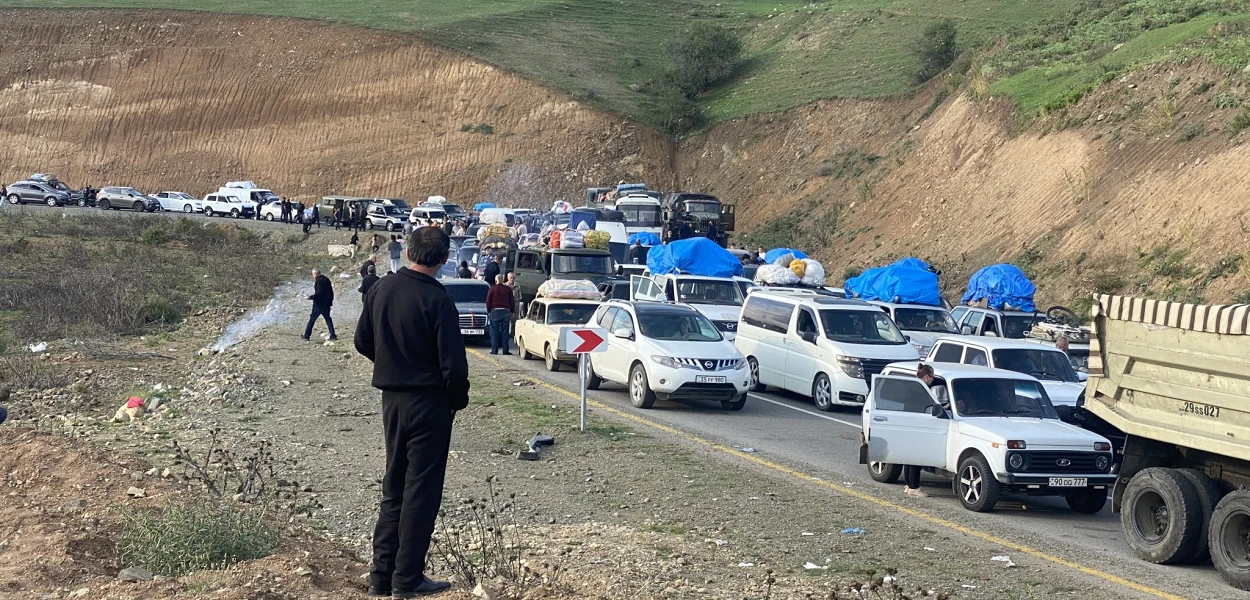
Ethnic cleansing in Nagorno Karabakh: the high cost of neo-Ottoman ambitions
Azerbaijan has ethnically and religiously cleansed Nagorno Karabakh of Armenian Christians, something CSI and other human rights groups had long warned would happen. The UN Security Council failed to act on these warnings. Its paralysis is due to a growing geopolitical dependence on an emerging pan-Turkic imperial constellation, writes CSI President John Eibner.

The exodus from Nagorno Karabakh. csi/Siranush Sargsyan
Commentary by Dr. John Eibner
A version of this article was published in German in the NZZ on October 6, 2023.
The deed is done: Azerbaijan has ethnically and religiously cleansed Nagorno Karabakh of Armenian Christians. Azerbaijani armed forces attacked and conquered this tiny unrecognized republic on September 19-20. The military offensive capped a nine-month blockade designed to starve the population into submission. Within days, over 100,000 terrified residents fled to Armenia. Their political leaders are now hostages in Azerbaijan.
Christian Solidarity International and other human rights groups had long sounded the alarm about potential genocide in Nagorno Karabakh. In August, Luis Moreno Ocampo, the first chief prosecutor of the International Criminal Court, echoed these warnings.
An explicit threat came from Azerbaijan itself. Two weeks before the military assault, Elchin Amirbayov, a senior advisor to the president of Azerbaijan, declared that “a genocide may happen” if Nagorno Karabakh doesn’t accept Azerbaijani rule and give up its principal political demand – the right to self-determination.
The UN Security Council remained inert despite these warnings. Its paralysis did not arise from the customary Russian and Chinese vetoes. It reflects instead the growing geopolitical dependence of all the Council’s permanent members on an emerging pan-Turkic imperial constellation.
At the head of this constellation is the militarily powerful NATO member Turkey, ruled by an authoritarian party related to the Muslim Brotherhood. But the weight of oil-rich Azerbaijan in the neo-Ottoman constellation is increasing rapidly.
Alliance between Turkey and Azerbaijan
Turkey’s current rulers, in power since 2002, have long nourished a dream of restoring Turkey to the power and prestige it enjoyed in the days of the Ottoman Empire, when much of the Islamic world was united under Turkish leadership. The rising alliance between Turkey and Azerbaijan, another Turkish Muslim land, is bringing Turkey closer to this goal.
This neo-Ottoman imperial constellation wields influence from the Balkans, through the eastern Mediterranean, Black and Caspian Seas and beyond, into Central Asia. It encompasses or borders a host of geopolitically sensitive conflict zones, among them Serbia/Kosovo, Cyprus, Syria, Iran, northern Iraq and Ukraine. Through its hosting of Hamas, Turkey touches the raw nerve running through Israel and the Palestinian territories.
Neo-Ottoman might has increased markedly in the wake of the war in Ukraine. Both the Washington-led Atlantic alliance and Russia see this as a war with existential stakes. Turkey and Azerbaijan use this to gain strategically important concessions from both sides. The ethnic cleansing of Armenians from Nagorno Karabakh is viewed in both the White House and the Kremlin as a trifling price to pay for neo-Ottoman favor.
The vision of a Greater Azerbaijan
But the eradication of Nagorno Karabakh’s Armenian community isn’t the endgame. Azerbaijan’s dictator, Ilham Aliyev, is driven by an ultra-nationalistic vision of a Greater Azerbaijan. This vision fits within the broader, Turkish-led neo-Ottoman power structure—an empire within an empire. Aliyev’s territorial ambitions extend beyond Armenia, which he openly labels as “West Azerbaijan,” to include the Azerbaijani-populated regions of northwestern Iran, which he refers to as “South Azerbaijan.”
To achieve this goal, the Turkish-Azerbaijani axis must be strengthened. The immediate neo-Ottoman political demand is for the establishment of a non-Armenian controlled transport corridor through Armenia – the so-called Zangezur Corridor. It would divide Armenia and connect Azerbaijan with Turkey via Armenia.
Azerbaijan has already gained much leverage for its claims by invading and occupying swaths of Armenian borderland territory. This has happened with scarcely a protest from any power in the international community. Washington appears ready to approve the Zangezur Corridor. Hard-pressed Russia is also ready to accept it, provided Moscow is its security guarantor.
Armenia’s increasingly authoritarian and unpopular government, led by Prime Minister Nikol Pashinyan, is attempting to navigate the crisis by making significant concessions to Turkey and Azerbaijan. The sacrifice of Nagorno-Karabakh’s Armenian population is just one example. Next on the agenda is a peace treaty with Azerbaijan – a treaty that, under these dire circumstances, is sure to amount to a “peace in our time” capitulation.
Pashinyan hopes to ensure his political survival by shifting Armenia’s geopolitical allegiance from Moscow to Washington. During a recent high-profile visit to Yerevan, Samantha Power, head of the U.S. Agency for International Development, and acting Assistant Secretary of State Yuri Kim buoyed him with substantial promises of American support. The EU follows suit.
Pashinyan reciprocates the American advances, even as Moscow labels his strategy “a big mistake.” Russia, possessing significant political, economic and cultural influence in Armenia—as well as a heavily armed military base—has various means to mete out punishment.
New front in the Great Power struggle
The stage is now set for a new front in the Great Power struggle between Russia and the U.S., this time in Armenia. As in Ukraine, both sides are likely to see support from the neo-Ottoman constellation as essential.
The dire implication is that the very forces that have been carrying out a genocide in phases against the Armenians since 1894 are about to become kingmakers in a conflict over the last surviving sliver of the Armenian homeland.
May Armenia itself be spared the grim fate of the Armenians of Nagorno Karabakh – or the people of Ukraine – as new fronts of Great Power conflict erupt in the neo-Ottoman sphere. The old “Great Game” of the imperial powers has returned with a bloody vengeance.
John Eibner, Ph.D. (London), is a historian and President of Christian Solidarity International. Thirty years ago, he and the Baroness Cox authored Ethnic Cleansing in Progress: War in Nagorno Karabakh.


